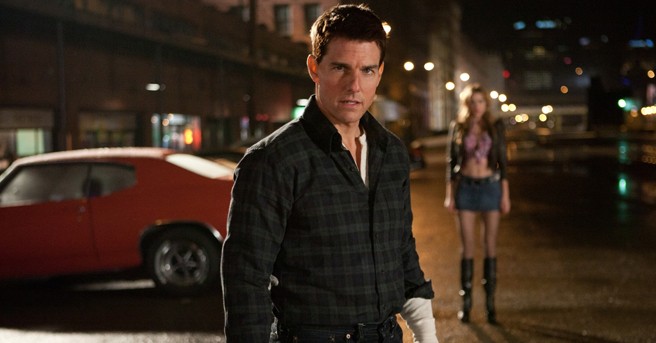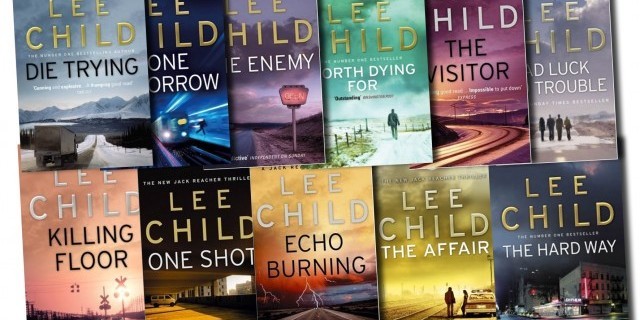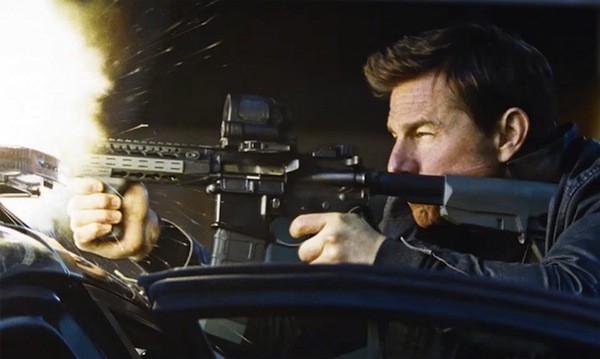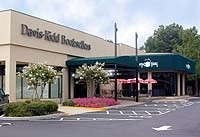Ignoring the caveat implicit in the title of his second Jack Reacher film, Never Go Back, Tom Cruise is indeed back in a role that still seems unsuited for him, despite some improvements over his first try in 2012, the eponymous Jack Reacher.

Tom Cruise as Jack Reacher
Bear with me: It needs to be understood that author Lee Child is releasing his 21st novel featuring the Jack Reacher character later this fall, and the Reacher of the eminently successful potboiler series has not shrunk. As always, the character is 6’ 5” tall, weighs 240 or so pounds, and is an absolute minimalist about weaponry, clothes, and transportation. Typically, he wears cheap but sturdy shoes, a t-shirt, off-the-rack pants, and a jacket if need be — all acquired at sale price (in thrift stores, if possible). His rudimentary clothing ensemble is intended to be discarded rather than washed and replaced with something similar.
Child’s Reacher is a nomad, a hitchhiker who, quite literally, follows his thumb, no destination known, like a rolling stone. Sometimes he takes a bus. As he avers in several of the novels, he doesn’t like driving, is not much good at it, and will sit behind the wheel of a car only when absolutely forced. As an Army veteran (last rank Major) he knows guns but normally disdains them. Reacher’s minimalism extends to language, as well. He speaks rarely, confining himself to the essential, as if to embody Strunk/White’s Elements of Style, and the single most recurrent phrase in Child’s novels, relevant to almost every situation his character encounters, is “Reacher said nothing.”

Jack Reacher has been the main character for 21 potboilers by Lee Chase.
What the randomly itinerant Reacher does do is find himself, at every turn of the innumerable roads he wanders, up against it with every variety of crook, scammer, bully, murderous megalomaniac, or sinister syndicate his author can devise. Normally Reacher himself is not the target of this evil; Odyssean Good Samaritan that he is, he finds himself in the position, more or less accidentally but over and over, of having to shield or avenge some innocent or group of innocents from villainous ill Intent (frequently stemming from ostensible pillars of society). More often than not, his mode of response is brute force, though some passing good intellection normally precedes his use of it.
And then there is Tom Cruise, 5’ 8’, who can’t possibly weigh more than 160 pounds sopping wet, and despite what has obviously been an enormous amount of pumping iron prior to filming, blowing his welterweight body out to absolute max, incapable of the pure strong-arm stuff the literary Reacher does. So what Cruise/Reacher does to right wrongs and conquer evil is a whole lot of martial-arts stuff, swift-kicking and karate-chopping four or five baddies at a time, simultaneously unloosing wisecracks of the pardon-my-knuckles variety. As in Jack Reacher, Cruise demonstrates a Nascar-style driving moment in an obligatory chase scene and wields assault weapons out the kazoo.

Tom goes bang bang.
In Never Go Back, Cruise’s reductio Reacher is assisted in his prodigies by Cobie Smulders as Captain Susan Turner, a wronged Army Captain whose mastery of Eastern combat arts and guncraft is, if anything, superior to his, and the screenplay — attributed to director Edward Zwick , Marshall Herskovitz , and Richard Wenk — arms her further with an up-to-date feminist pride that won’t play second to Reacher’s banana.
The plot, little more than an extended McGuffin chase, concerns a nefarious scheme by Turner’s superior officers to sell deadly arms to bad-guy insurgents in Afghanistan, and, though it takes most of the film’s 118 minutes running time to overcome, it Is quelled fairly easily. More interesting is a sub-plot involving Danika Yarosh as Samantha Dayton, a 15-year-old waif who may or may not be Reacher’s daughter from a long-ago tryst with a prostitute. Needless to say, Dayton becomes an integral and resourceful partner with Reacher and Turner in resolving the main threat, and her relationship with Reacher is the source of some genuinely affecting moments like those between Alison Lohman and Nicolas Cage as another are-they-or-aren’t-they father-daughter team in Ridley Scott’s 2003 film about con artists, Matchstick Men.
It ain’t really Reacher, since the Cruise character is more Jackie Chan than Paul Bunyan, but the film makes for passable entertainment, especially for those who aren’t purist aficionados of the Lee Child books. Director Zwick, a onetime journalist, developed his chops in tv shows like Thirtysomething and Family and went on to do some impressive hit movies, like Glory and Legends of the Fall. He’s more or less slumming here, but his sense of pacing, at least, can’t be faulted.
Never Go Back: It Ain’t Really Reacher, but it’s Passable Entertainment
